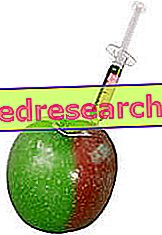Definition
Cholera is an infectious and highly contagious disease that affects the gastrointestinal tract.
The infectious agent responsible for the onset of the disease is a particular type of beating: Vibrio cholerae .
Causes
As mentioned, cholera is caused by an infection sustained by Vibrio cholerae . More in detail, the disease is triggered by an enterotoxin produced by the latter.
The infection is contracted by consuming water or food (in particular, vegetables and seafood) contaminated by the faeces of sick, convalescent or carriers. Therefore, cholera is transmitted via the fecal-oral route.
Symptoms
Cholera has an incubation time ranging from a few hours to five days, at the end of which the symptoms occur.
The first symptoms of cholera consist in the appearance of discharges of watery diarrhea and vomiting, resulting in rapid dehydration and loss of body weight. Following these manifestations, symptoms such as fever, oliguria or anuria, hypokalemia, hypotension, hypovolemia, feeling of intense thirst, drowsiness, asthenia, muscle cramps, tachycardia and tachypnea may also arise.
Information on cholera - drugs and cholera treatment is not intended to replace the direct relationship between health professional and patient. Always consult your doctor and / or specialist before taking Cholera - Drugs and Cholera Treatment.
drugs
Of course - being caused by a bacterial infection - the drugs used to treat cholera are antibiotics.
The use of these drugs serves more than anything else to decrease the duration of the disease, to reduce its spread and to facilitate the recovery of patients.
In addition to antibiotic treatment, it is essential to provide timely rehydration of the patient by administering specific saline solutions, to be administered orally or parenterally.

Tetracycline
Tetracyclines are one of the most widely used classes of antibiotics in the treatment of cholera. However, the use of tetracycline in children and adolescents under 12 years of age is not recommended, due to the side effects that can occur.
Among the various tetracyclines available, those most used in the treatment of cholera are:
- Doxycycline (Bassado ®, Miraclin ®): doxycycline is available for oral administration. Usually, the dose used in adults and adolescents over 12 years of age is 100-200 mg of drug per day, or according to the doctor's prescription.
- Tetracycline (Ambramycin ®): tetracycline is also available for oral administration. The usual dose used in adults and adolescents over 12 years of age is 15-25 mg / kg of body weight. If the doctor considers it necessary, he can decide to administer a larger dose of the drug.
Macrolides
Macrolides can also be used in the treatment of cholera, particularly in children, since tetracycline treatment is not recommended.
The most widely used macrolide in this case is:
- Clarithromycin (Macladin ®, Klacid ®, Veclam ®): when administered orally, the dose of clarithromycin usually used in children from six months of age to twelve years of age is 7.5 mg / kg of body weight, to be taken twice daily. In adults and adolescents over 12 years of age, on the other hand, the dose of medication usually used by mouth is 250-500 mg of drug, to be taken every 12 hours. Furthermore, in this category of patients, clarithromycin can also be administered parenterally at a dose of 4-8 mg / kg of body weight per day, to be taken in two divided doses. However, the exact amount of active ingredient to be used must be established by the doctor.
Fluoroquinolones
Some types of fluoroquinolones have also been shown to be effective in treating cholera. Among these, we recall:
- Ciprofloxacin (Ciproxin ®, Kinox ®, Macar ®, Samper ®): ciprofloxacin can be administered both orally and parenterally. The amount of drug to be taken will have to be established by the doctor on an individual basis, depending on the severity of the infection. Indicatively, the dose of medication usually administered orally in adults is 500-1000 mg per day. The duration of treatment usually ranges from 5 to 21 days, but this period can be extended in the case of very serious infections.
Prevention and Vaccine
The prevention of cholera is based primarily on compliance with simple hygiene rules, such as hand washing, water sterilization that is suspected to be contaminated (in fact, the cholera vibrio is sensitive to high temperatures) and adequate food cooking.
To prevent the onset of this disease, however, an oral vaccine is also available which is able to protect adults and children from two years of age from the contraction of the infection: Dukoral ®.
In adults and children over six years of age, the vaccine should be given in two divided doses 1-6 weeks apart.
In children between the ages of two and six, however, the vaccine should be administered in three divided doses 1-6 weeks apart.
However, in order for the vaccine to carry out its protective action, a period of time of one week must elapse after the last administration.



